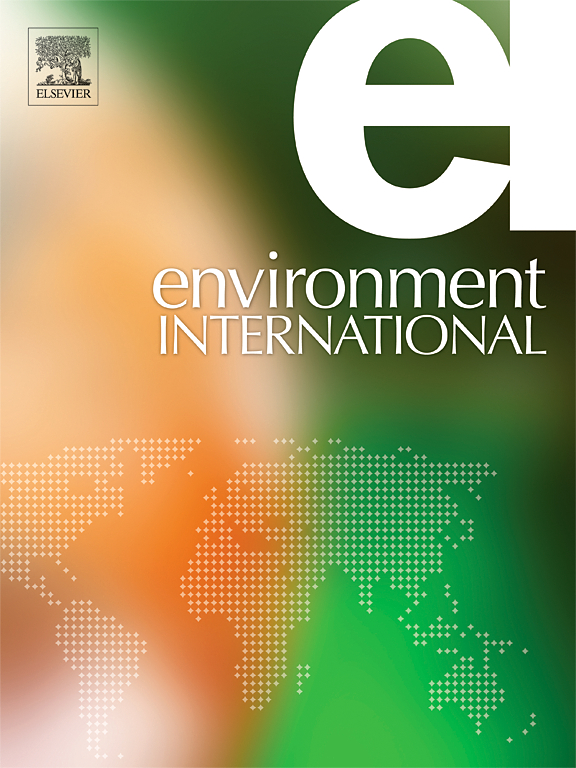高脂肪饮食下环境浓度的抗生素暴露:对肠道微生物群和代谢的影响
IF 10.3
1区 环境科学与生态学
Q1 ENVIRONMENTAL SCIENCES
引用次数: 0
摘要
抗生素在各种环境中无处不在,在环境浓度下接触抗生素甚至是不可避免的。在这里,我们研究了环境相关浓度的阿奇霉素(AZI)和环丙沙星(CIP)对高脂肪饮食(HFD)条件下小鼠肠道微生物群和宿主代谢的影响。长期接触微量抗生素可引起微生物群落结构的显著变化。AZI显著改变了雄性和雌性小鼠的短链脂肪酸(SCFA)谱,显著增加了醋酸盐、丁酸盐和丙酸盐的产量。AZI和CIP显著提高了雄性小鼠的体重,改变了血清激素水平和血清代谢谱。此外,抗生素暴露显著重构了微生物与宿主的相互作用,包括微生物与scfa和微生物与代谢物的关系。值得注意的是,在暴露于AZI的雌性小鼠中,乳酸杆菌在形成整体SCFA谱方面发挥了重要作用。我们的研究结果表明,暴露于微量抗生素和HFD会对肠道微生物群和宿主代谢产生明显的影响,这强调了对易感人群面临的潜在健康风险进行进一步调查的必要性。本文章由计算机程序翻译,如有差异,请以英文原文为准。


Antibiotic exposure at environmental concentrations under high-fat diet: Impacts on gut microbiota and metabolism
Antibiotics are ubiquitously present in various environments, and exposure to antibiotics at environmental concentrations is even inevitable. Here, we investigate the impact of environmentally relevant concentrations of Azithromycin (AZI) and Ciprofloxacin (CIP) on the gut microbiota and host metabolism in mice under High-Fat Diet (HFD) conditions, administered via drinking water. Long-term exposure to trace antibiotics was observed to induce significant alterations in the microbial community structure. AZI significantly altered Short-Chain Fatty Acid (SCFA) profiles, markedly increasing acetate, butyrate, and propionate production in both male and female mice. AZI and CIP significantly elevated body weight in male mice and altered serum hormones levels along with the serum metabolic profile. Moreover, antibiotic exposure significantly restructured the microbe-host interactions, encompassing both microbe-SCFA and microbe-metabolite relationships. Notably, Lactobacillus has played an essential role in shaping the overall SCFA profile in female mice exposed to AZI. Our findings indicated that exposure to trace antibiotics in conjunction with HFD elicits distinct effects on the gut microbiota and host metabolism, underscoring the need for further investigation into the potential health risks faced by susceptible populations.
求助全文
通过发布文献求助,成功后即可免费获取论文全文。
去求助
来源期刊

Environment International
环境科学-环境科学
CiteScore
21.90
自引率
3.40%
发文量
734
审稿时长
2.8 months
期刊介绍:
Environmental Health publishes manuscripts focusing on critical aspects of environmental and occupational medicine, including studies in toxicology and epidemiology, to illuminate the human health implications of exposure to environmental hazards. The journal adopts an open-access model and practices open peer review.
It caters to scientists and practitioners across all environmental science domains, directly or indirectly impacting human health and well-being. With a commitment to enhancing the prevention of environmentally-related health risks, Environmental Health serves as a public health journal for the community and scientists engaged in matters of public health significance concerning the environment.
 求助内容:
求助内容: 应助结果提醒方式:
应助结果提醒方式:


